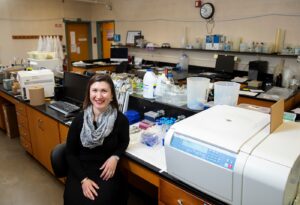When we see someone who is successful, rarely do we think of the failures and mistakes they encountered along the way, but everyone who has accomplished their definition of success has faced setbacks. Failing is a normal thing.
Christine Cutucache is the director of the UNO STEM TRAIL Center, an associate professor of biology at UNO, and Haddix Community Chair of Science. She has a Ph.D. in Genetics, Cell Biology, and Anatomy. Dr. Cutucache has a huge amount of passion for the STEM TRAIL, which stands for Science, Technology, Engineering, and Mathematics Teaching, Research, and Inquiry-based Learning. The STEM TRAIL Center “provides resources and materials to undergraduates, graduates, and faculty members at UNO and lifelong learners (reaching K-12 and adult learners) beyond,” according to its website. The STEM TRAIL Center works to make STEM more accessible and understandable to people of all levels.

Dr. Christine Cutucache, Associate Professor of Biology and Haddix Community Chair of Science
Dr. Cutucache says she didn’t plan to go into science at all, let alone to the extent that she has. She didn’t want to go to college and instead planned to be a mechanic. Thanks to her high school counselor’s encouragement, she went to college. Then, her undergraduate mentor talked her into going to grad school and getting her Ph.D. “I’ve always hated school . . . now I try to make that better for students,” she said. “I try to make things interesting and applicable.”
For Dr. Cutucache, everything is about the ROI (return on investment). “If faculty viewed their roles as how they can contribute to the wider bottom line, just like in a business, we’d be the better off for it,” she said. That’s her philosophy. In order to get that return, the right resources and guidance must first be put in place. Dr. Cutucache said something that really stood out: give people the permission to fail.
It’s no secret that STEM is a challenging field that has an issue with diversity. The work field struggles with underserved communities like women and BIPOC finding careers. Only 9% of STEM workers are Black, according to Pew Research Center. Women make up 28% of the STEM workforce, according to the National Girls Collaborative Project.
Most people think the issue is getting individuals interested in STEM or to take those first steps once they find the interest. Dr. Cutucache doesn’t think recruitment is the issue, it’s actually retention. Seventy-four percent of middle school girls showed interest in science and engineering, according to the National Girls Collaborative Project. This study showed Black students go to college for a degree in STEM and show interest, but are 40% more likely to switch out of STEM than white students (this article discusses why). It’s not that kids aren’t interested in science, but the lack of support or a safe environment once they are enrolled in STEM. “Retention looks like a lot of things, but most of the time retention is simply a building of an ecosystem of support rather than focusing on content and things like that,” she said.
Dr. Cutucache talked about the Lencioni Trust Pyramid, which lays out the characteristics needed for a successful team. The bottom of the pyramid is trust. Trust is needed in order to have confidence in yourself and your peers. Something amazing could have been created, but others aren’t on board because of competing egos or a past bridge being burnt. There needs to be a comfortable, trusting environment where they can explore without the fear of being ridiculed for making a mistake, Dr. Cutucache said. “We have to provide a warm, welcoming environment that is safe, where there can be candid conversations had and great trust,” she said.
Giving people the permission to fail doesn’t only apply to students or STEM. Dr. Cutucache also spoke about entrepreneurs and their need for a safe space to make mistakes. She has discovered the importance and need for entrepreneurship in this region and pushes for entrepreneurs and small businesses to stay in Nebraska. “In my experience, folks in Nebraska are pretty risk-averse,” she said. “The more that we can get them comfortable in trying things and say, ‘It’s okay if you fail, no big deal, but look at all the skills you’re generating over that time,’ that’ll be the better option.” Entrepreneurs don’t just need opportunities to succeed and the skill sets to do so, but also the confidence and empowerment.
Whether you’re a STEM student, an entrepreneur, or just an everyday person, feeling safe and comfortable in your environment is essential. Making mistakes and failing is all a part of the path to success.




